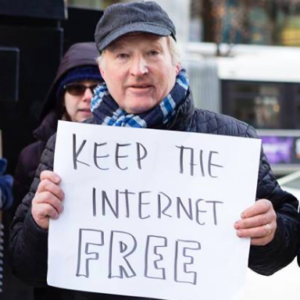President Joe Biden’s recent Executive Order on Promoting Competition in the American Economy contained a grab bag of initiatives covering nearly every major sector of the economy. One of the most harmful provisions of the bunch is a call for the return of heavy-handed Obama-era net neutrality regulations. As Congress and the White House engage in ways to close the digital divide, imposing net neutrality regulations would seriously undermine the progress they are working toward.
Under former Federal Communications Commission (FCC) Chairman Tom Wheeler, the FCC adopted Title II net neutrality rules in 2015, which subjected internet service providers (ISPs) to Great Depression-era regulations designed for monopoly telephone services. ISPs are already regulated under Title I of the Communications Act, but Title II regulations would grant the FCC significantly more unilateral power to regulate ISPs. Under the leadership of then-Chairman Ajit Pai, the FCC moved to return to a light-touch regulatory framework that helped produce a vibrant online ecosystem. The response from net neutrality advocates was overwhelming hyperbole, with Senate Democrats claiming consumers would get the internet “one word at a time.” Despite the internet now being faster, more widely available, and cheaper, it appears Title II net neutrality advocates are unperturbed.
While metrics are trending in the right direction, there is still work to be done to bring unconnected Americans online. The COVID-19 pandemic has highlighted the critical role internet access plays in our lives. Closing the digital divide, the gap between those with and without adequate internet access, is a laudable goal and private-public partnerships have made significant progress in addressing it. A 2021 FCC report estimates there are fewer than 14.5 million Americans without access to internet service, although this number may change once more granular maps are developed. The areas still lacking internet access require innovative solutions and sizable investments. If Title II net neutrality regulations are put in place, the harmful effects won’t just be felt by those with internet access, but also by those communities (primarily rural and low-income) on the other side of the digital divide as they must wait even longer for broadband access.
ISPs are among the top spenders on capital. A 2021 report named ISPs among the top investors in capital during the pandemic, and the private sector continued investments helped keep prices low despite soaring demand. Encouraging high levels of investment is vital to building out infrastructure in unserved areas and developing new technologies. However, Title II net neutrality regulations could stifle these investments when it’s needed most. An analysis from the Phoenix Center found the threat of onerous Title II regulations reduced telecommunications investment by $30-$40 billion annually between 2011 and 2015. It simply does not make sense for the government to spend billions on broadband infrastructure while the president simultaneously encourages the FCC to disincentivize private sector investment.
Other problems await consumers if the FCC answers Biden’s call for reclassification. While there is some common ground between Republicans and Democrats on the principles of net neutrality, Title II classification comes with certain legal obligations. Will Rinehart, former Director of Technology and Innovation Policy at the American Action Forum, notes that by the letter of the law, edge providers like Netflix or Google would be required to pay ISPs direct payments. Reclassification, as Lawrence Spiwak points out, turns these edge providers into “customers” of ISPs, and in this relationship, edge providers would be required, under Title II, to pay a positive (above zero) rate to ISPs. These increased costs would likely be passed along to consumers. Tim Wu, who coined the term “net neutrality” and sits on Biden’s National Economic Council, argued higher prices for consumers would be a preferable outcome, but consumers would likely disagree.
Since Title II regulations were developed specifically for monopoly telephone service, they would grant the FCC additional power to regulate broadband rates. The FCC, to its credit, forbore enforcing those onerous regulations previously. However, that does not change the underlying fact that the FCC would have this authority under Title II. Former FCC Commissioner Michael O’Rielly in his dissent stated, “the item claims to forbear from certain monopoly-era Title II regulations while reserving the right to impose them using other provisions or at some point in the future.” Biden’s recent call for preferencing government-run networks and claim that “Americans pay too much for the internet” should cause concern whether a Biden FCC would be similarly reserved in enforcing these draconian measures.
The imposition of onerous internet regulations would be a massive step backward as the public and private sectors work to close the digital divide. The light-touch approach has been served consumers well. There is a role for the FCC and the federal government to play in closing the digital divide, but heavy-handed Title II reclassification will not make broadband service more widely available. Targeted funding and reforms to the Universal Service Fund to encourage private sector investments are better alternatives to reach unserved communities. There is plenty of room for creative problem solving but returning to misguided and failed policies of the past would be a mistake. If the administration is serious about closing the digital divide, steering clear of Title II regulations would be a great place to start.

